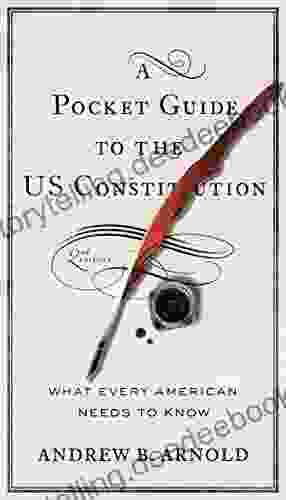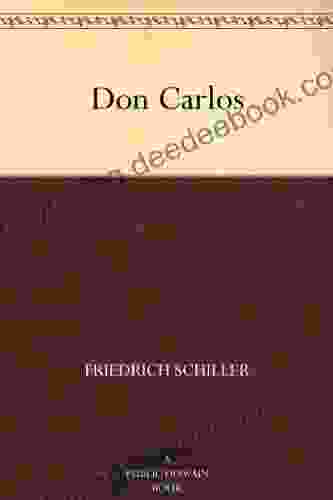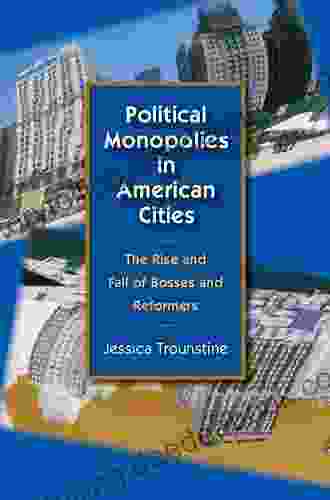What Every American Needs To Know Second Edition: An Essential Guide to the History and Principles of the United States

4.6 out of 5
| Language | : | English |
| File size | : | 1909 KB |
| Text-to-Speech | : | Enabled |
| Screen Reader | : | Supported |
| Enhanced typesetting | : | Enabled |
| Word Wise | : | Enabled |
| Print length | : | 217 pages |
The United States of America is a nation of immigrants, a melting pot of cultures and beliefs. But what does it mean to be an American? What are the values and principles that have shaped our country? And what are the challenges that we face today as a nation?
These are questions that have been asked by generations of Americans, and they are questions that are more relevant than ever in today's rapidly changing world.
What Every American Needs To Know is an essential guide to the history and principles of the United States. This fully updated second edition provides a comprehensive overview of American history, from the founding of the colonies to the present day. It also examines the fundamental principles of American government and civics, and explores the challenges that we face as a nation.
Whether you are a high school student studying American history for the first time, or an adult who wants to learn more about the country you live in, What Every American Needs To Know is the perfect resource.
American History
The history of the United States is a story of immigration, opportunity, and innovation. It is a story of people from all over the world coming together to build a new nation, and of the challenges and triumphs that they have faced along the way.
In this section, we will explore the major events and themes of American history, from the founding of the colonies to the present day. We will learn about the people who shaped our nation, the wars that we have fought, and the challenges that we have overcome.
The Founding of the United States
The United States was founded in 1776, when thirteen British colonies declared their independence from Great Britain. The colonists were inspired by the Enlightenment ideals of liberty, equality, and self-government. They fought a long and bloody war for independence, and in 1783 they won their freedom.
The new nation was founded on the principles of democracy and republicanism. The Constitution of the United States, adopted in 1789, established a system of government in which the people elect their representatives and the government is limited by law.
The Growth of the United States
In the years after its founding, the United States expanded rapidly westward. American settlers moved into new territories, and the country grew in size and population. The United States also acquired new territories through war and purchase, including the Louisiana Territory, the Florida Territory, and the Oregon Territory.
The growth of the United States was accompanied by a growing sense of national identity. Americans began to see themselves as a unique people, with their own values and traditions. They developed a strong sense of patriotism and a belief in the American Dream.
The Civil War
The Civil War was a turning point in American history. The war was fought between the Northern and Southern states over the issue of slavery. The North won the war, and slavery was abolished in the United States.
The Civil War was a bloody and divisive conflict, but it also helped to define the character of the United States. The war showed that the United States was a nation that was willing to fight for its ideals, and it helped to strengthen the bonds of national unity.
The United States in the 20th Century
The United States played a major role in the 20th century. The country fought in two world wars, and it emerged from the war as a global superpower. The United States also made significant contributions to science and technology, and it became a leader in the fields of education, healthcare, and social welfare.
The 20th century was also a time of great social and political change in the United States. The country experienced the Civil Rights Movement, the women's rights movement, and the environmental movement. These movements helped to make the United States a more just and equitable society.
The United States in the 21st Century
The United States entered the 21st century as the world's sole superpower. The country faces a number of challenges in the 21st century, including terrorism, climate change, and economic inequality. However, the United States also has a number of strengths, including its strong economy, its diverse population, and its commitment to democracy and human rights.
The future of the United States is uncertain, but the country has a long history of overcoming challenges and adapting to change. The United States is a nation of immigrants, and it is a nation of hope. The American Dream is still alive, and it is a dream that continues to inspire people from all over the world.
American Government
The United States government is a representative democracy. The people elect their representatives to make laws and carry out the laws of the land. The government is divided into three branches: the legislative branch, the executive branch, and the judicial branch.
The Legislative Branch
The legislative branch is responsible for making laws. The legislative branch is made up of the Senate and the House of Representatives. The Senate is composed of two senators from each state. The House of Representatives is composed of 435 members, who are elected from districts based on population.
The legislative branch has the power to make laws, declare war, and impeach the president. The legislative branch also has the power to approve treaties and to confirm presidential appointments.
The Executive Branch
The executive branch is responsible for carrying out the laws of the land. The executive branch is headed by the president. The president is elected by the people for a term of four years.
The executive branch also includes the vice president, the cabinet, and the federal agencies. The cabinet is made up of the heads of the different executive departments, such as the Department of State, the Department of Defense, and the Department of Justice.
The executive branch has the power to enforce the laws, conduct foreign policy, and appoint judges to the federal courts.
The Judicial Branch
The judicial branch is responsible for interpreting the laws. The judicial branch is made up of the Supreme Court, the federal courts of appeals, and the federal district courts.
The Supreme Court is the highest court in the land. The Supreme Court has the power to interpret the Constitution and to overturn laws that it finds to be unconstitutional.
The federal courts of appeals are located in different regions of the country. The federal courts of appeals have the power to review decisions made by the federal district courts.
The federal district courts are the trial courts of the federal system. The federal district courts have the power to hear cases involving federal law.
American Civics
American civics is the study of the rights and responsibilities of citizens in the United States. Civics education helps people to understand how the government works, how to participate in the political process, and how to make a difference in their communities.
Some of the key concepts of American civics include:
- The rule of law
- Democracy
- Individual rights
- Civic responsibility
The Rule of Law
The rule of law is the principle that everyone is subject to the law, no matter who they are. The rule of law is essential to a just and orderly society.
In the United States, the rule of law is based on the Constitution. The Constitution is the supreme law of the land, and it protects the rights of all Americans.
Democracy
Democracy is a system of government in which the people rule. In a democracy, the people elect their representatives to make decisions on their behalf
4.6 out of 5
| Language | : | English |
| File size | : | 1909 KB |
| Text-to-Speech | : | Enabled |
| Screen Reader | : | Supported |
| Enhanced typesetting | : | Enabled |
| Word Wise | : | Enabled |
| Print length | : | 217 pages |
Do you want to contribute by writing guest posts on this blog?
Please contact us and send us a resume of previous articles that you have written.
 Book
Book Page
Page Chapter
Chapter Text
Text Genre
Genre Reader
Reader Library
Library E-book
E-book Magazine
Magazine Sentence
Sentence Bookmark
Bookmark Bibliography
Bibliography Foreword
Foreword Annotation
Annotation Footnote
Footnote Codex
Codex Tome
Tome Classics
Classics Biography
Biography Autobiography
Autobiography Memoir
Memoir Reference
Reference Encyclopedia
Encyclopedia Thesaurus
Thesaurus Character
Character Resolution
Resolution Librarian
Librarian Catalog
Catalog Card Catalog
Card Catalog Borrowing
Borrowing Archives
Archives Study
Study Reserve
Reserve Journals
Journals Literacy
Literacy Thesis
Thesis Dissertation
Dissertation Reading List
Reading List Theory
Theory Textbooks
Textbooks Deb Buckingham
Deb Buckingham Lenny Duncan
Lenny Duncan Charles Morgan
Charles Morgan Brenna Maloney
Brenna Maloney El Griffin
El Griffin Ann Richards
Ann Richards Chloe Taylor
Chloe Taylor Priscilla Lee
Priscilla Lee Paul Fairfield
Paul Fairfield Jake Maddox
Jake Maddox Martin Misenhimer
Martin Misenhimer H G Wells
H G Wells Andrew Livesey
Andrew Livesey Maki Fukuoka
Maki Fukuoka Anne Orr
Anne Orr L C Mortimer
L C Mortimer Jack J Kanski
Jack J Kanski 2013th Edition Kindle Edition
2013th Edition Kindle Edition Oren Cass
Oren Cass Dinesh D Souza
Dinesh D Souza
Light bulbAdvertise smarter! Our strategic ad space ensures maximum exposure. Reserve your spot today!

 Simon MitchellThe Lean Six Sigma Recipe: A Comprehensive Guide to Achieving Operational...
Simon MitchellThe Lean Six Sigma Recipe: A Comprehensive Guide to Achieving Operational... Vladimir NabokovFollow ·19.9k
Vladimir NabokovFollow ·19.9k Jamal BlairFollow ·14.8k
Jamal BlairFollow ·14.8k John GrishamFollow ·12.4k
John GrishamFollow ·12.4k Martin CoxFollow ·9.7k
Martin CoxFollow ·9.7k Jesus MitchellFollow ·2.2k
Jesus MitchellFollow ·2.2k Nikolai GogolFollow ·15.7k
Nikolai GogolFollow ·15.7k Jay SimmonsFollow ·18.2k
Jay SimmonsFollow ·18.2k Johnny TurnerFollow ·3k
Johnny TurnerFollow ·3k

 Howard Blair
Howard BlairClassical Music Themes for Easy Mandolin, Volume One
Classical Music Themes for Easy Mandolin,...

 Paulo Coelho
Paulo CoelhoThe Heretic Tomb: Unraveling the Mysteries of a Lost...
Synopsis In Simon Rose's captivating debut...

 Rodney Parker
Rodney ParkerThe Passionate Friends Annotated Wells: A Deeper...
Unveiling the...

 Ed Cooper
Ed CooperDelicious Stories of Love, Laughs, Lies, and Limoncello...
In the heart of...

 Elmer Powell
Elmer PowellHal Leonard Piano For Kids Songbook: Unleashing the...
Music holds immense...
4.6 out of 5
| Language | : | English |
| File size | : | 1909 KB |
| Text-to-Speech | : | Enabled |
| Screen Reader | : | Supported |
| Enhanced typesetting | : | Enabled |
| Word Wise | : | Enabled |
| Print length | : | 217 pages |












